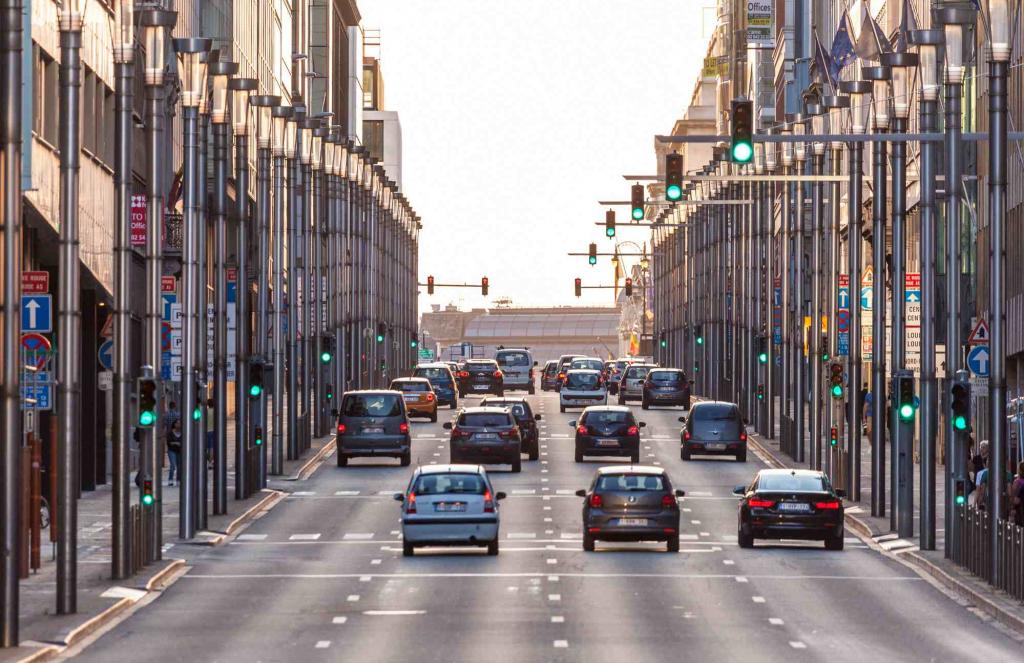Thessaloniki gets ready for its metro launch in November
The underground rapid transit lines have been under construction for almost two decades due to various project delays
 TheMayor.EU logo
TheMayor.EU logo 
Most of the transit traffic will no longer pass through Brussels' city centre , Source: Depositphotos
People’s usual routes to home or work will probably change, but so will the air quality and the noise levels
Today, the new mobility plan for the Brussels city centre enters into force. It is also known as ‘The Pentagon’, due to its characteristic shape. The plan itself will focus on redesigning the flow of traffic in a way that helps transit drivers go out of the centre and boosts the quality of life in local residential areas and public spaces.
Brussels Alderman for Mobility, Bart Dhondt, went on social media to celebrate the new traffic plan, urging citizens to come to the city centre and “sniff the clean air”.
According to a statement by the City of Brussels, the new traffic plan will come into force today, and the result should be a safer city for all travellers – pedestrians, cyclists or car drivers.
Additionally, to help smoothen the transition, authorities have also developed two digital tools, that will help everyday citizens. One is a subscription parking system for bikes, while the other is a digital traffic plan that can help guide drivers, pedestrians and cyclists along the safest and fastest routes through the city centre.
Although the plan falls short of banning motor vehicles in the city centre altogether, according to local authorities, it would still help to improve air quality, noise levels and traffic in the city. One important note is that the plan should help foster what mobility experts call an ‘evaporation effect’.
This means that when an area becomes harder to access by car, instead of moving elsewhere, traffic tends to ‘evaporate’, while people switch to different modes of transportation. Additionally, one of the main goals of the plan is to push traffic out of the city centre and more towards the circular boulevard and urban freeway surrounding the pentagon.
Furthermore, the new mobility plan is part of Brussels’ Good Move initiative, which aims to reduce car traffic in the Belgian capital by 24% by 2030. According to an official statement, local authorities say that people’s routes home or to work will change.
However, they point out that their neighbourhoods will also become much quieter and cleaner, due to the reduced traffic.

The underground rapid transit lines have been under construction for almost two decades due to various project delays

Now you can get your wine in Talence by paying directly in Bitcoin

That’s because the state has to spend money on updating the railway infrastructure rather than subsidizing the cost of the popular pass

Rethinking renewable energy sources for the urban landscape

The examples, compiled by Beyond Fossil Fuels, can inform and inspire communities and entrepreneurs that still feel trepidation at the prospect of energy transition

Now you can get your wine in Talence by paying directly in Bitcoin

The 10th European Conference on Sustainable Cities and Towns (ESCT) sets the stage for stronger cooperation between the EU, national and local level to fast track Europe's transition to climate neutrality.

At least, that’s the promise made by the mayor of Paris, Anne Hidalgo

The underground rapid transit lines have been under construction for almost two decades due to various project delays

At least, that’s the promise made by the mayor of Paris, Anne Hidalgo

Hostal de Pinós is located in the geographical centre of the autonomous region

Despite its church-y name, the district has long been known as the hangout spot for the artsy crowds

Urban dwellers across the EU are having a say in making their surroundings friendlier to people and the environment.

Forests in the EU can help green the European construction industry and bolster a continent-wide push for architectural improvements.

Apply by 10 November and do your part for the transformation of European public spaces

An interview with the Mayor of a Polish city that seeks to reinvent itself

An interview with the newly elected ICLEI President and Mayor of Malmö

A conversation with the Mayor of Lisbon about the spirit and dimensions of innovation present in the Portuguese capital














